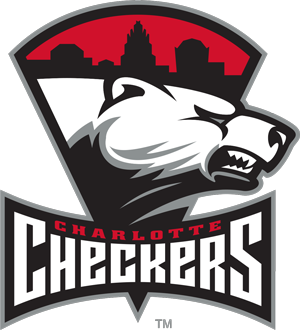With 22 goals in 210 man advantages, Charlotte’s power play is producing at a 10.5 percent clip, the lowest in the AHL by nearly four whole percentage points.
Despite its ineptitude on paper, the coaching staff has remained positive on its units throughout the year. Head coach Ulf Samuelsson has many a time stated his happiness with the way the team has been moving the puck on the man advantage, with the low numbers coming from a struggle to finish plays. To dig into what’s ailing the power play, you can start from the beginning with the breakout. The Checkers have been using a newly implemented system in which a player will carry the puck in the neutral zone then make a drop pass to a trailing teammate, who then ideally fires a lateral pass to a second trailer before entering the zone with the puck. That style, which has become a staple among most NHL and AHL teams recently, gives the power-play unit an advantage when it works correctly.
“We want the other team to have a bad gap,” said Checkers video coach Myles Fee on the thought process behind the system. “We want to suck them back to their blue line, and when we drop that puck we want our fourth and fifth guys coming up with a full head of steam. So the defensemen are flat, they’re at a full stop on the blue line. That’s the worst fear of a defenseman, to be flat with a guy coming at you at 25 miles an hour. It’s hard to handle and that’s what we hope to get from the drop pass.”
Many of the Checkers’ struggles on the man advantage can be traced back to poor execution on those breakouts and zone entries. By breaking down previous game video, the coaching staff has been able to hone in on specifics as to why it isn’t working, in hopes to remedy it.
“Bringing the puck in, sometimes there’s not enough speed or not enough deception,” said Fee. “We talk a lot in our video sessions about moving closer to their guys to draw them in and then dropping the puck. We want to make them close on you to draw one or two in and then we’re dropping the puck. That makes our breakouts and entries a lot cleaner.”
Sending drop passes in the neutral zone can be tricky play, especially when a simple mistake could end up with a shorthanded breakaway for the opponents. That can lead to some hesitance from the players, something the team has been working to overcome all year.
“There definitely is a learning curve and it’s definitely unnatural to want to carry the puck towards a player and look them in the eye as you get closer and closer,” said Fee. “You have to have some nerve to do it and some faith that your teammate is behind you where you talked about to get that pass. I think our execution has been a lot better as the season has progressed and I think that’s from familiarity between players and familiarity with the system.”
While they have put a focus on improving the way they move through the neutral zone, that’s only half of the battle for the Checkers’ power play.
“Once you’re in the zone, it’s a lot about the mindset,” said Fee. “There is a static set play and then from there it evolves.”
The Checkers have been able to create sustained pressure in the offensive zone once clearing the blue line through much of the season, but currently mired in an 0-for-21 over the last eight games, the final finish has been missing.
“In-zone we talk a lot about movement and deception,” said Fee. “Rather than the fake shot and then pass, we want to do a fake pass and then shot. That means you’re closer to the net and so they want to move closer to the pass. Patty Dwyer has scored a couple like that this year.”
Fee and the rest of the coaching staff have been stressing the need for “fast shots,” not in the sense of velocity, but in the sense of a quick release, pointing to Andrew Poturalski’s top shelf snipe in Saturday’s loss. In addition, they’ve pushed the need to jump on rebounds and collapse around the net after shots, something that Fee’s former team, the Edmonton Oilers, thrived on.
“I don’t want to use the word aggressive, but retrievals have to be a battle,” said Fee. “You can’t just put your stick out and think because it’s a power play you’re going to get it back.”
One facet of their game that has been working is getting traffic in front, something the coaching staff wants to continue moving forward.
“We want our guys to create a block,” said Fee. “Not just stand there and be a pillar, sometimes a little movement makes the goalie lose sight of the puck, he can’t find it. He’s looking one way and then he’s got to fight back the other way and it’s going in the net.”
Fee singled out one player in particular as flourishing in that role.
“Zykov is unbelievable,” he said. “He’s a big body and he can stand there and deflect pucks but he can move too. When we played the Monsters, their goalie couldn’t see anything around Zykov. One time the goalie is down looking square at a butt, another time he’s fighting to look around him, and that’s when the puck goes in the other side.”
None of this is to say that the Checkers’ power play is a lost cause. The team boasts an abundance of talent on both power-play units and they believe they can break through here down the final stretch of the season.
“Every day after practice we work on stuff like that,” said Fee. “Ulf has set up drills to help. We talk about the power play and we show video of us and we show them NHL clips all the time. We have the luxury of getting the overhead camera on our goals. So when there is a dead-on shot we can see where the lanes are. So we have more angles to work with than most teams. We’re working on it.”
LINEUP UPDATES
There were two faces missing Tuesday morning, as Levko Koper and Bryan Bickell were absent from practice. Thankfully, neither forward’s status appears to be in jeopardy.“It was a maintenance day for Koper,” said Samuelsson. “Bickell is getting treatment but we anticipate both being available for the games in Winnipeg.”
The rest of the Checkers’ injured contingent appear to be at various levels of recovery. Mitchell Heard was a full participant in practice for the first time since getting hurt, while veteran forward Patrick Dwyer resumed skating with the team in a yellow no-contact jersey over the weekend. Michael Leighton took a quick spin around the ice with just skates and a stick before practice over the weekend and again Tuesday, but has yet to rejoin the team.
With no new injuries to report, the Checkers have been running with similar line combinations and defensive pairings over the last few weeks, with Samuelsson liking the chemistry that has been developing. A rough weekend doesn’t appear to have changed his mind.
“You’re looking over what lines have done what,” said Samuelsson. “We also now have a couple borderline injuries that we have to weigh into the equation too. I think if you have established yourself as a solid line over a long period of time, one or two games without production doesn’t really change that. You want to stick with what you have.”
ASSESSING THE WEEKEND
The Checkers ran into a surging Bakersfield team this past weekend and couldn’t keep up, dropping both contests by a combined score of 12-4.Lopsided scores aside, the coaching staff was able to pull some positives from the two-game series, though while one aspect of their game rose, the other sunk.
“We did create a lot of chances and we scored some goals, but at the other end we have to get tighter defensively and work together as a group to get our goals against down,” said Samuelsson. “But we had a lot of good things too that we want to take with us.”
Both Alex Nedeljkovic and Daniel Altshuller got a start over the weekend, but neither could find their footing, keeping the goalie completion going.
“We’re still looking for one of the two young goalies to take the ball and run with it,” said Samuelsson. “Whoever wants it, it’s right there.”
Samuelsson recognizes it’s a tall order, but hopes his goalie tandem can quickly bounce back for the weekend.
“It’s the toughest position in that aspect, for sure,” said Samuelsson of the mental impact struggling goalies go through. “You have to have a short-term memory and look forward to these next two games and talk yourself into making a big difference.”



